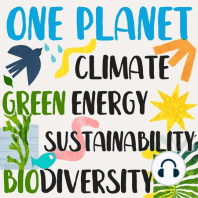20 min listen

Kent Redford - Co-author of "Strange Natures: Conservation in the Era of Synthetic Biology”
Kent Redford - Co-author of "Strange Natures: Conservation in the Era of Synthetic Biology”
ratings:
Length:
56 minutes
Released:
Sep 9, 2022
Format:
Podcast episode
Description
Kent H. Redford is a conservation practitioner and Principal at Archipelago Consulting established in 2012 and based in Portland, Maine, USA. Archipelago Consulting was designed to help individuals and organizations improve their practice of conservation. Prior to Archipelago Consulting Kent spent 10 years on the faculty of University of Florida and 19 years in conservation NGOs with five years as Director of The Nature Conservancy’s Parks in Peril program and 14 years as Vice President for Conservation Science and Strategy at the Wildlife Conservation Society. For six years he was Chair of IUCN’s Task Force on Synthetic Biology and Biodiversity Conservation. In June 2021 Yale University Press published Kent’s book with W.M. Adams: Strange Natures. Conservation in the Era of Synthetic Biology."The field of synthetic biology, which is known by some as extreme genetic engineering – that's a name mostly used by people who don't like it - amounts to a set of tools that humans have developed to be able to very precisely and accurately change the genetic code, the DNA of living organisms in order to get those organisms to do things that humans want. So the applications in medicine are predominantly devoted to trying to make us healthier people, and they range from some really exciting work on tumor biology to work on the microbiome, which is all of the thousands and tens of thousands of species that live on our lips, our mouths, our guts, our skin. And in agriculture, it's primarily directed at crop genetics, trying to improve the productivity of crops, the nutritional value of crops, the ability of crops to respond to climate change, and a whole variety of other things. Some people may have heard of one of these tools called CRISPR used to very precisely alter the sequences of DNA.“So probably because of the way that these technologies were first introduced to people, that is through Monsanto's application relating to creating herbicide-resistant crops and the inability of farmers to save seeds for patented reasons, this objection to the application of genetic technologies is often co-assocated with regenerative agriculture and with the organic food movement, but there is no reason that that should be the case. And in fact, there is a strong argument to be made that if we are going to be able to continue to feed people, we must be able to alter the genomes of the major agricultural crops as well as significant minor crops for continents like Africa. If we're going be able to keep up with the changes in the climate, the increasing number of people, and the increasing demands of society for certain kinds of food over others. So, whereas I certainly am all in favor of regenerative agriculture and organic, it doesn't mean that you have to be against the potential application of these other technologies.My favorite example has to do with the reef-building corals. So coral reefs, as most people know, are a tremendously important part of biodiversity. They support hundreds, if not thousands of species of fish and plants and microbes and invertebrates. They also are critical sources of profitable fishing. There is work going on now on a variety of different fronts to try to see whether there are ways to modify genetically, both the genomes of the coral organisms themselves, as well as these microbes, the algae that live inside them, and photosynthesize in order to try to allow these corals to survive the warming oceans."https://yalebooks.yale.edu/book/9780300230970/strange-natures/ https://archipelagoconsulting.comwww.oneplanetpodcast.orgwww.creativeprocess.info
Released:
Sep 9, 2022
Format:
Podcast episode
Titles in the series (100)
(Highlights) Noah Wilson-Rich · Co-founder/CEO, The Best Bees Company, Largest US Beekeeping service…: Interviewed by Mia Funk & Sydney Field · Associate Podcast Producer Sydney Field by One Planet Podcast · Climate Change, Politics, Sustainability, Environmental Solutions, Renewable Energy, Activism, Biodiversity, Carbon Footprint, Wildlife, Regenerative Agriculture, Circular Economy, Extinction, Net-Zero